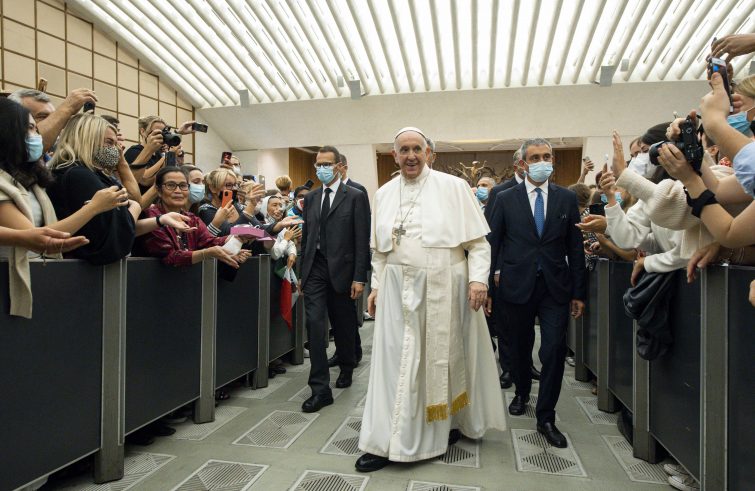
“It was a pilgrimage of prayer, a pilgrimage to the roots, a pilgrimage of hope. Prayer, roots and hope.” In Wednesday’s general audience the Pope summarised the main steps of his apostolic journey to Budapest and Slovakia that ended a week ago: “a pilgrimage of prayer in the heart of Europe, beginning with adoration and ending with popular piety.” “Praying, this is what the People of God are called to, above all: to worship, to pray, to journey, to be a pilgrim, to do penance.”
Francis’ voiced his concern at the heart of the European continent: “the presence of God is diluted – we see this every day – by consumerism and by the ‘vapours’ of a uniform way of thinking – something strange but real – that is the fruit of the mixture of old and new ideologies.”
“This leads us away from familiarity with the Lord”, Francis denounced in unscripted remarks. In this context, “the healing answer comes from prayer, witness and humble love. The humble love that serves. Let us reiterate this idea: the Christian is to serve. This is what I saw in the encounter with the holy people of God. What did I see? A faithful people, that has suffered atheist persecution. I also saw it in the faces of our Jewish brothers and sisters, with whom we remembered the Holocaust.” Because “there is no prayer without memory”, of our stories. As the one shared with the Pope by one of the Slovak bishops who told him he had worked as a tram conductor to avoid the persecution and continue practising his ministry.
“During this journey to the heart of Europe I often thought of the fathers of the European Union” – Francis said – “of how they dreamed of it not as an agency to spread fashionable forms of ideological colonisation.”
“In meeting my brother bishops, both in Budapest and in Bratislava, I was able to experience directly the grateful remembrance of these roots of faith and of Christian life”, Francis told the faithful gathered for the general audience. “On several occasions I insisted on the fact that these roots are always living, full of the vital lymph that is the Holy Spirit, and that as such they must be conserved”, the Pope explained:
“not like museum exhibits, not ideologised and exploited out of interests of prestige and power, to consolidate a closed identity. No. This would mean betraying them and making them barren!
Cyril and Methodius are not, for us, people to commemorate, but rather models to imitate, masters from whom we can always learn the spirit and method of evangelization, as well as civil commitment.”
“Violence towards women remains an open wound everywhere”,
denounced Francis, who paid tribute to the “strong and prophetic witness of Blessed Anna Kolesárová, a Slovak girl who at the cost of her life defended her dignity against violence.” Finally, the journey that ended a week ago was a pilgrimage of hope: “I saw great hope in the eyes of the young, in the unforgettable encounter in the stadium in Košice.”
“This gave me hope too, seeing so many young couples and so many children. And I thought of the demographic winter that we are going through,
and those countries are blooming with young couples and children: a sign of hope.” “I saw hope in many people who silently care for and are concerned about their neighbour”, the Pope said referring to the meeting with the Missionary Sisters of Charity of the Bethlehem Centre in Bratislava: “good sisters, who receive those who are rejected by society: they pray and serve, pray and help. And they pray a lot, and help a lot, without pretence”, was the Pope’s tribute along with a request to applaud Mother Teresa and her sisters.
“The Roma are our brothers and sisters: we must welcome them, we must be close to them
like the Salesian Fathers there in Bratislava”, was the Pope’s the closing appeal. “It was moving to share in the feast of the Roma community: a simple feast with the perfume of the Gospel”, Francis remarked referring to the visit to the Roma community, “and all those who work with them on a path of fraternity and inclusion.” “This hope can only be realised can only be realised and made concrete if it is expressed in another word: together”, Francis said: “Hope never disappoints, hope goes not alone. In Budapest and Slovakia we found ourselves together with the different rites of the Catholic Church, together with our brothers and sisters of other Christian denominations, together with our Jewish brothers and sisters, together with the believers of other religions, together with the weakest. This is the path, because the future will be one of hope if we are together, not alone.”









